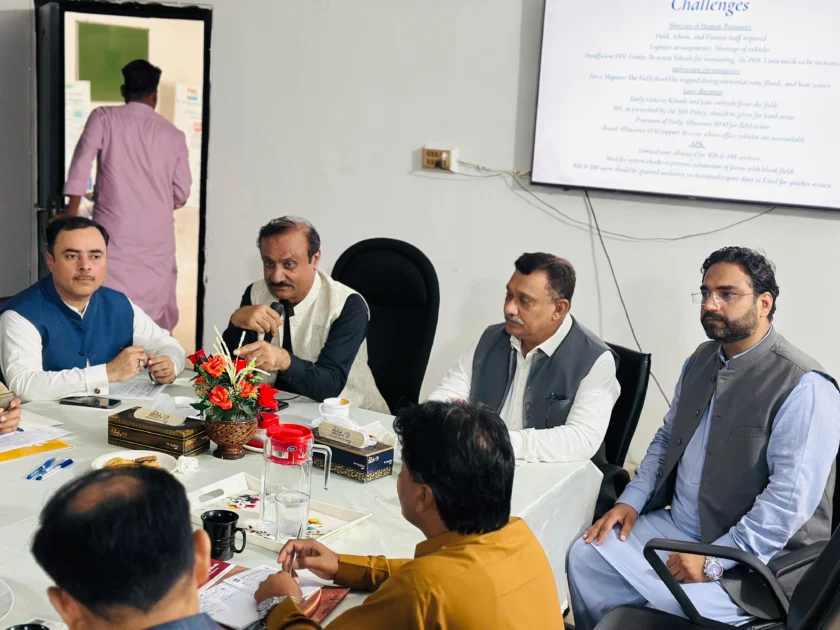- Web Desk Karachi
- Sep 05, 2025

Women’s representation in decision-making institutions in Pakistan is less than 10 percent, says KU VC
-
- Web Desk Karachi
- Dec 23, 2024

KARACHI: The women’s representation in the decision-making institutions of the country is less than 10 percent and more or less this figure is almost the same in the private sectors. We usually talk a lot about empowering women but the reality is starkly different.
Our society hardly values advice given by women and does not bother to follow them. These views were expressed by the Vice Chancellor of the University of Karachi Professor Dr Khalid Mahmood Iraqi on Saturday.
He was addressing a panel discussion and seminar titled “Women in Leadership: Summit for Excellence,” organized by the KU’s Dr A.Q. Khan Institute of Biotechnology and Genetic Engineering in collaboration with the Organization for Women in Science for the Developing World Pakistan National Chapter and the Pakistan Academy of Sciences.
The KU VC Professor Dr Khalid Iraqi proudly mentioned that the University of Karachi stands as a living example of providing equal representation to women. He added that in any society, political, social, and economic changes and development require that women have the autonomy to make their own decisions.
He observed that providing opportunities without gender discrimination is essential for social and economic progress, and believes that parents play a key role in this regard. He expressed that instead of discouraging girls, we should encourage them. Pakistan has yet to create an environment where women can freely contribute to society’s development.
He emphasized that we formulate state policies, but they remain confined to documents. He added that to empower women, we must promote gender equality. Referring to neighboring and Western countries, he said that women in these regions have the freedom to make their own decisions, and that is why they are contributing significantly to their countries’ economies.
The KU VC Professor Dr Khalid Iraqi hoped that in Pakistan, too, women will be provided with ample opportunities to contribute freely to their careers, future, and the nation’s development. He shared that women are serving in institutions like the European Union, European Parliament, IMF, and World Bank and hoped that Pakistani women will also serve the nation like other parts of the world.
On this occasion, the member of the National Assembly Syeda Shehla Raza shared that the first opposition you face often comes from your immediate surroundings. She said that if we can overcome this circle, we can tackle external challenges. She added that convincing our families is the first step.
She expressed that girls and women need to be aware of their rights. We should avoid making one-sided decisions without listening to affected girls/women, give our girls confidence, and respect the woman, not just the relationship. She paid tribute to the first female prime minister of the Muslim world Shaheed Benazir Bhutto for her services, especially her efforts to empower women.
Earlier, Secretary of OWSD Pakistan Chapter Professor Dr Saima Saleem mentioned that this summit celebrates the contributions, achievements, and aspirations of women leaders across diverse fields. It also provides a platform for dialogue on leadership challenges and opportunities while highlighting the importance of inclusivity, mentorship, and empowerment.
The Director of the Centre for Excellence for International Collaboration at Hamdard University Professor Dr Ahsana Dar Farooq delivered a keynote address and the session also included video messages from the Rector of Millennium Institute of Technology and Entrepreneurship Professor Dr Huma Baqai and the Associate Director of Office of International Studies in Education, Michigan State University Dr Julie Sinclair, and followed by an empowering talk by the Founder of Depilex Smile Again Foundation and CEO of Depilex Groups Masarrat Misbah.
A panel discussion on “My Journey: Stories of Strength, Struggles, and Success” featured accomplished panelists, including Professor Bina S. Siddiqui (S.I., T.I.), the President of OWSD Pakistan National Chapter and Higher Education Commission distinguished national professor, Professor Ahsana Dar Farooq, Syeda Shehla Raza, Professor Dr Erum Khan, Chairperson of Department of Pathology and Laboratory Medicine, Aga Khan University Hospital, Professor Dr Shaista Tabassum KU’s Dean of the Faculty of Arts and Social Sciences, Professor Najma Patel Paediatric Cardiologist and Adult Congenital Heart Diseases Specialist and Head of Department of Paediatric and Congenital Heart Diseases, Ziauddin University Hospital, Dr Nosheen Raza Khan Assistant Professor, Department of Sociology and Students’ Advisor, University of Karachi. They shared inspiring narratives of resilience and leadership, offering valuable insights to the audience.
Poster presentations showcasing participants’ journeys as women in diverse roles added a personal and interactive element to the event.






